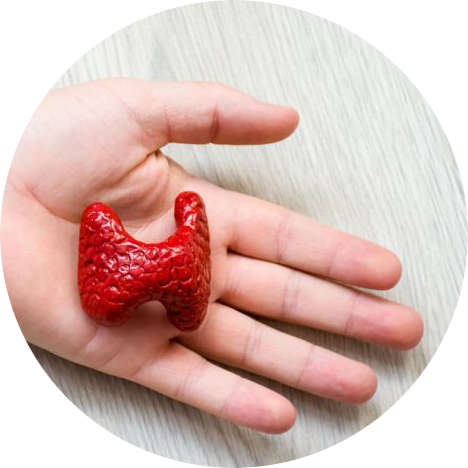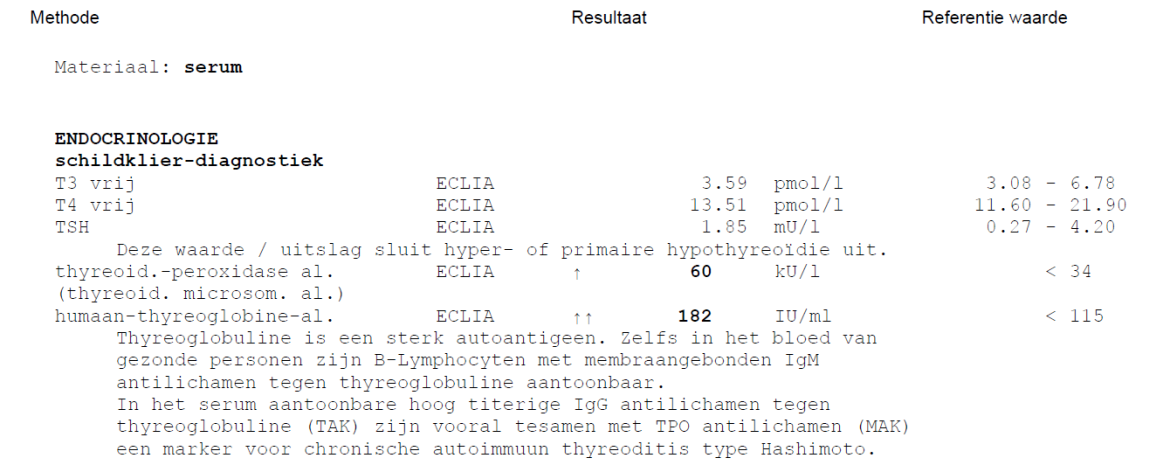A slow-working thyroid gland without knowing it? That is quite possible. Many patients with a slow thyroid gland do not notice this for a long time. However, sometimes there are clear indications, but the regular tests at the doctor's don't show anything. What do you do then? This happened to 21-year-old Karin. For years, doctors couldn't figure out what she had, but thanks to a test from Blood Values Test, there is finally clarity: she has Hashimoto 's autoimmune disease, which slowly leads to damage to her thyroid gland and therefore to other organs and her immune system.
Karin has been walking around with symptoms such as fatigue, low blood pressure, unstable blood sugar and dizziness since she was 13 years old. Complaints that many thyroid patients have. Doctors waved it away under the heading of "puberty," but it wasn't. "At one point I thought: am I crazy?" she says. In the past decade she has been to a family doctor at least eight times. And each time she came home empty-handed. "I became despondent." After all, the family doctor only tested for TSH, but that - like many others - revealed nothing. The protocol at GPs is that if the TSH is good, no further testing for free T4 is done, so that was never done for Karin.
Although the name may not be immediately illuminating, Hashimoto's disease is a common disorder. It affects adult women in particular. Those with Hashimoto's disease have a slow-working thyroid gland. The autoimmune disease is usually the diagnosis of a slow thyroid gland. The disease confuses the immune system and causes it to attack the thyroid gland. This causes the thyroid gland to produce fewer hormones. Eventually it will stop working altogether, if something is not done about it in time.

Hashimoto's disease is often accompanied by vague symptoms that can also be attributed to other illnesses, such as tingling fingers, hair loss, low blood pressure and fatigue. General practitioners are therefore quick to think of burnout or overwork. Usually the function of the thyroid gland deteriorates so slowly that patients do not realise for a long time that they are ill. Only later do the symptoms appear and sometimes the doctor finds an enlargement of the thyroid gland on physical examination, a goiter.
In Hashimoto, the body makes antibodies against the thyroid protein Peroxidase (TPO). These pose no direct danger to the thyroid gland itself, but do cause autoimmune inflammation in the tiny, butterfly-shaped, organ. TPO also destroys thyroid tissue.
Taking matters into your own hands
When I went to university the symptoms got worse. She got yellow hands and feet and other people noticed that too. She was referred to the gastroenterologist (MLD-doctor), because they suspected that something was wrong with her liver. After all, jaundice is usually related to liver problems. But the MDL-doctor also sent her home with the message that I was a healthy girl.
She took matters into her own hands and went online to find a solution. "I googled blood values and yellow hands and feet. It had to be my thyroid." Karin bought a test from Blood Values Test and what did it reveal? She has Hashimoto's disease. "I felt so much relief. Finally something was found!" A day before she got the results, she had fainted and had to stay in the emergency room for some time until she felt better.

Meanwhile, she has also been to the endocrinologist. "That was very nice. A thorough examination was done and it showed that my adrenal glands may not be functioning properly either." The combination of Hashimoto's disease and malfunctioning adrenal glands causes a considerable disruption in the body. An adrenal stimulation test was recently done to clarify the situation, but the results are still pending.
Hashimoto and appropriate diet
In the meantime, Karin has adapted her lifestyle somewhat and has been able to reduce her symptoms with the help of as few medications as possible. There is no standard diet for patients with Hashimoto. What helps one person may actually cause symptoms for another. "I follow the Paleo diet, but I do eat potatoes and rice. Those products don't cause any problems. I don't eat gluten or beans. I don't eat pasta either. The other day I ate pasta again and a day later I was yellow," she says in a cheerful, yet unsurprised tone. She also regularly has to throw up when she eats something she shouldn't.
Karin doesn't take thyrax or other thyroid medication, but she does take a thyroid extract that contains a small amount of hormones. "This makes me less yellow. I also take herbs and supplements for my adrenal glands that make me sleep much better." Since Karin has known the results, she has felt much better. She has been able to adjust her diet accordingly and now knows what to look out for. "The difference between a year ago and now is really big."
Do you suspect a thyroid disorder? Test yourself!
General practitioners often only test certain blood values. Via Blood Values Test you can perform various tests that will give you insight into the functioning of your thyroid gland.
You have a choice:
* a test via anti-TPO and Anti-TG finds out if you have Hashimoto' s disease;
* Ablood test for general thyroid abnormalities, testing your TSH, Free T4 and FT3;
* and many more tests that can be purchased when thyroid disease is suspected.


